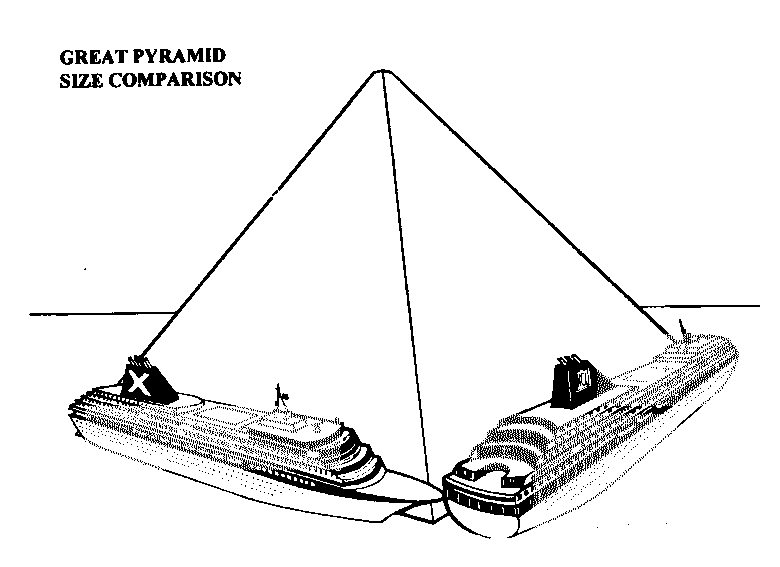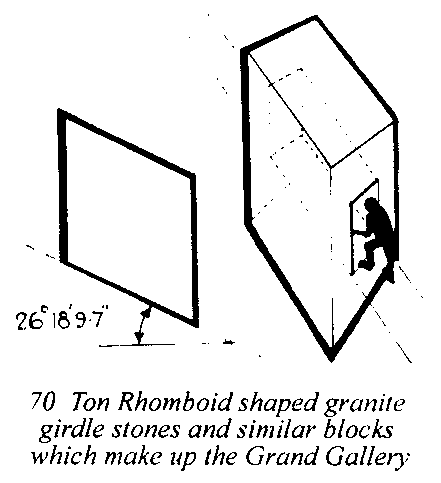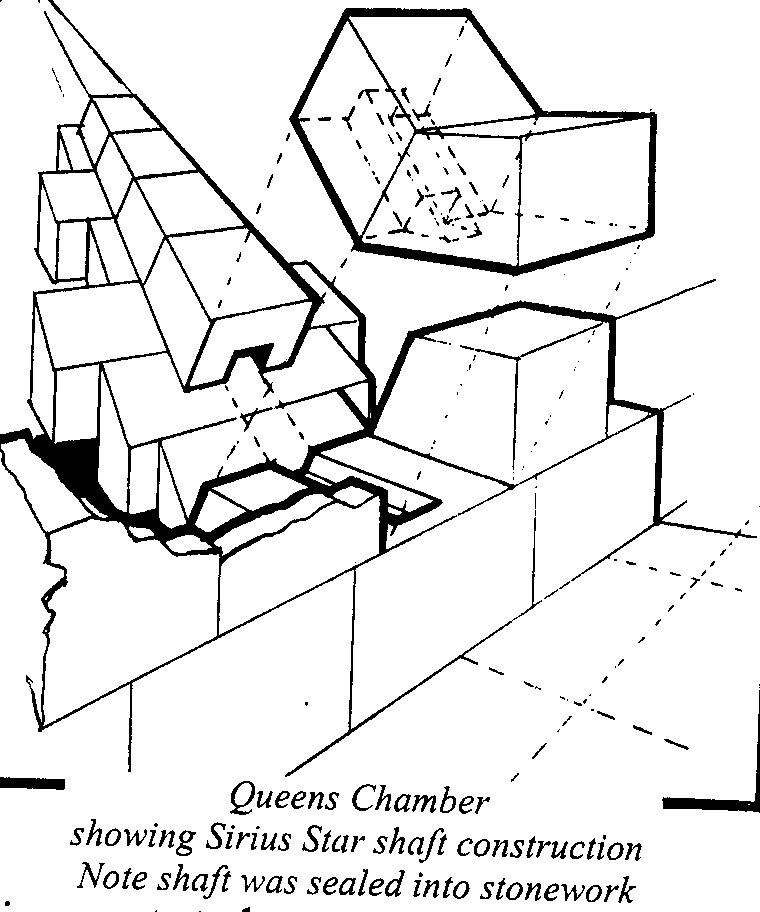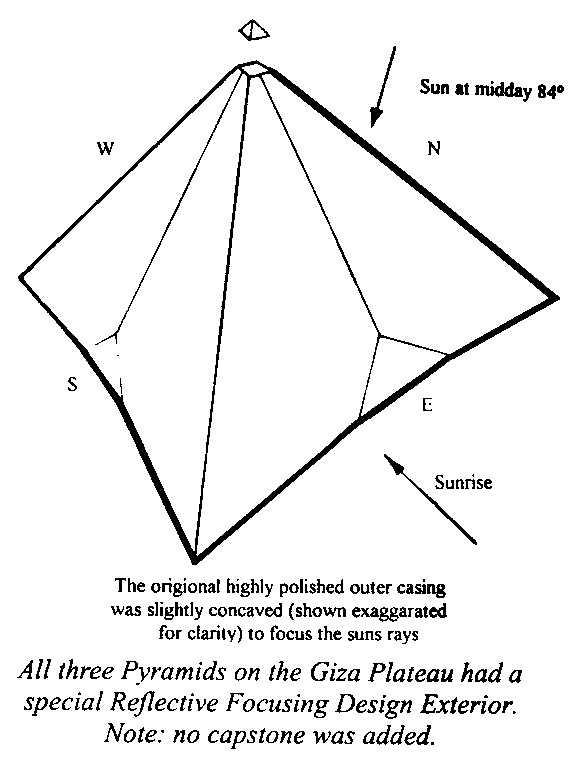
There are many who are beginning to subscribe to the new ideas, put forward
by such writers as Hancock
and Bauval, that the date of their construction must be placed further
back in time - back perhaps to some 10,500 BCE and not a mere 2,500 BCE as
current 'experts' claim.
This has been convincingly placed in the domain of public and academic
discussion by a well reasoned set of arguments as stated in their books.
There are many reasons why the Egyptians are reluctant to allow well organised, concerted international investigations to take place all over the Giza Plateau.
Primarily, I consider, there is the question of 'gifts', - to put it at its
mildest, -
that is part of the natural culture of the region itself!
 It is not my intention to pass judgement on this issue, especially as
it is a cultural one, and therefore does not rightfully become a subject
that another culture should pronounce the 'rights and wrongs' of! Oh that
it were so easy as that. There are political and security implications too!
All our world problems would be solved if everyone adhered to the same
ethics. But which ones - and whose?
It is not my intention to pass judgement on this issue, especially as
it is a cultural one, and therefore does not rightfully become a subject
that another culture should pronounce the 'rights and wrongs' of! Oh that
it were so easy as that. There are political and security implications too!
All our world problems would be solved if everyone adhered to the same
ethics. But which ones - and whose?
The fact remains that there are valid theories coming forward that do merit academic consideration. Unfortunately there are those who have devoted a lifetimes work in the study of the area, and they would have that whole work cast aside if they accepted the new concepts being put forward. It would be to ignore human nature if one expects such 'experts' to just roll over and admit they 'might, just might' be wrong after all.
 This leaves those few brave individuals who are not so burdened with the desire for
personal status, approval of their peers, and pride, to stand up and be
counted. This is now beginning
to happen. It is gradually becoming the 'Age of Enlightenment' for mankind.
It is dawning that man has a different past than previously
thought, and that man is not who we thought!
This leaves those few brave individuals who are not so burdened with the desire for
personal status, approval of their peers, and pride, to stand up and be
counted. This is now beginning
to happen. It is gradually becoming the 'Age of Enlightenment' for mankind.
It is dawning that man has a different past than previously
thought, and that man is not who we thought!
 The strange and complex design and content of the Great Pyramid is a wonder
to behold. Even today there are world-recognised experts in the subject of
Egyptology, whose names are considered academia's best; men and women who run
departments of Egyptology for famous museums et al, who would have us to
believe that one can carve granite with copper tools! They do not have an answer!
The strange and complex design and content of the Great Pyramid is a wonder
to behold. Even today there are world-recognised experts in the subject of
Egyptology, whose names are considered academia's best; men and women who run
departments of Egyptology for famous museums et al, who would have us to
believe that one can carve granite with copper tools! They do not have an answer!
I recently watched a television broadcast where an American gentleman was
attempting to build a pyramid 18ft high as a means of proving his theory.
He could not do it! The excuse, for that is what it was, was that he
didn't have enough time! He should have spent more time on his homework
beforehand perhaps! It wasn't square, the stones didn't fit, and only two
sides were finished in any way! "Not proven"!
Acccording to other 'experts' the time of the building of the Great Pyramid was before the iron age! Also it is important to remember that at the supposed time the Egyptians did not have knowledge of the wheel!
Part of the film narrative explained how the limestone blocks were split
using wooden wedges. Lying atop of a squared off block of limestone was a
12lb or 14lb sledgehammer of modern bright iron along with iron-tipped tools
for cutting away at the stone! Where were the copper tools? Why wasn't there
a demonstration of granite being dressed using copper tools??
It was either
deliberately omitted, or it was total incompetence! So much for 'experts'.
A local politician one said that "an 'expert' is someone who comes from
more than 50 miles away". I am very inclined to agree with him.
One can often learn more by what is not stated than by what is!
Also to be considered is the question of "Where are the rejects" - those great
blocks of either limestone or granite which became damaged in transportation
or placement? If there were no
damaged ones, then "Why not?" All materials in the Great Pyramid fit too well
together to be of the type of manufacture that was previously accepted. Using the
methods claimed there have to be rejects! Where are they? You would think that
they would be lying around somewhere.
As is often the case, academics do not ask practical questions but have a
mindset based on a classical education as opposed to a practical one! There
has to be a consideration of both levels of expertise.
Like so many of us, I too want to learn the truth so that I and others may
share in it and by learning those truths help to produce that climate of
'spiritual' change required to make make this small planet of ours a better
and safer place to live in.
We have to know where we come from, and who we
are to do this. It is therefore incumbent upon us to recognise those new
concepts and new theories and to accept
that there can be other alternatives to previously held theories as to who we
are, and from when we come.
We have to take them on board, test them, evaluate them from quite
different perspectives than those that have hitherto been used - and
accept new 'truths' where they don't fly in the face of credibility and are
not put forward by those whose main aim is to maintain the status quo, -
especially if their reputations rely on denying and ridiculing them!.
Some of those new 'answers' more than likely lie withing the hidden mysteries
of the Great Pyramids - especially, so far as we are concerned, those
at Giza.
A problem that has 'dogged' previous investigation of all things
archeological in the Middle East region is the unfortunate desire of past
acedemics to try to fit the history of the region into the Christian
Biblical calendar. To make history 'fit' into the Biblical texts has led
to history being re-written and on occasion deliberately 'distorted' to fit
'the facts' as promulgated by Christianity!
 It is since the discovery of the Nag Hammadi scrolls that there has been
able to be a re-alignment of thinking. These particular scrolls have had a
more direct impact, in my opinion, that the discovery of the Dead Sea
Scrolls themselves. The latter were the source of perhaps greater
controversy and rancour and publicity, and there is still a lot to be
learned. Here again, vested interest came into play. Fortunately the Nag Hammadi
documents have thrown light on the actual lifestyle of people in the years
immediately before and after the period of Jesus of Nazareth and his
disciples and subsequent followers. This has allowed a more realistic
approach to be made with respect to pyramidal researches as certain
'dogmatic assumptions' can now be put aside for the time
being and allow rational, less biased progress to be made.
It is since the discovery of the Nag Hammadi scrolls that there has been
able to be a re-alignment of thinking. These particular scrolls have had a
more direct impact, in my opinion, that the discovery of the Dead Sea
Scrolls themselves. The latter were the source of perhaps greater
controversy and rancour and publicity, and there is still a lot to be
learned. Here again, vested interest came into play. Fortunately the Nag Hammadi
documents have thrown light on the actual lifestyle of people in the years
immediately before and after the period of Jesus of Nazareth and his
disciples and subsequent followers. This has allowed a more realistic
approach to be made with respect to pyramidal researches as certain
'dogmatic assumptions' can now be put aside for the time
being and allow rational, less biased progress to be made.